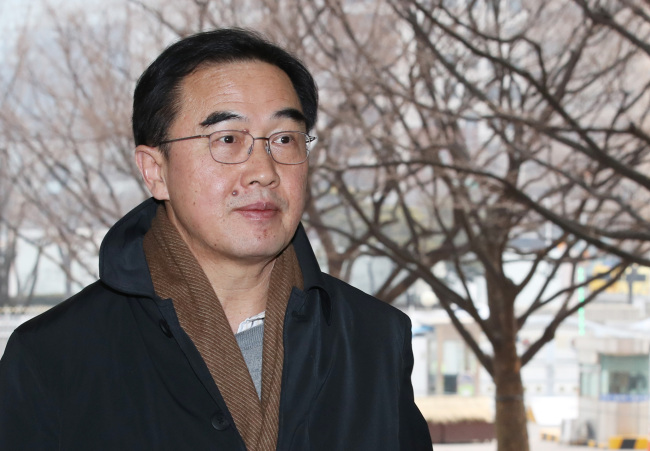South Korea’s unification minister said Monday that it will be a “good opportunity” for the two Koreas to discuss peace and inter-Korean relations when the North‘s high-level delegation makes a trip here to join next month’s PyeongChang Winter Olympic Games.
“Through meetings and contacts with the North‘s high-level delegation ... we expect it will serve as a good opportunity to have frank discussion about improving inter-Korean relations and peace,” Cho Myoung-gyon said in an interview with a local broadcaster.
“We expect that the North will send a delegation that will be fit for it.”
The North has agreed to join the Olympics slated for Feb. 9-25 and the 10-day Paralympics that start on March 9, which will be staged in the South’s eastern towns of PyeongChang and Gangneung.
 |
South Korean Unificatino Minister Cho Myung-gyun (Yonhap) |
It also plans to send a 140-member art performance group and a high-level delegation to the South in time for the sporting event.
Who will lead the delegation has not been decided.
On Sunday, an advance team led by Hyon Song-wol, head of a national orchestra, came to the South for a two-day stay to inspect candidate venues for the North‘s art performance. The delegation is to leave for the North later Monday.
The visit came after the North abruptly canceled the planned trip Friday. South Korea has asked for explanation from the North on the matter.
Cho said that he has yet to get an answer from the North, nor did he think that the currently visiting team is in a position to explain the cancellation.
He noted that the South will continue close consultation with the North to prevent such a thing from happening again.
Cho said that the North is paying close attention to the planned art performances and added that Hyon appears to be a “highly professional” person when it comes to making the relevant preparations.
Asked about the controversy over the two Koreas’ plan to field a unified women‘s ice hockey team during the Winter Olympics, he apologized for not providing sufficient explanation to the public in advance but still supported the decision, expressing hope that it will contribute much to fostering peace on the Korean Peninsula.
Critics here said that South Korean players are being forced to make a sacrifice for the sake of making it possible for some North Korean athletes to join them. They also criticized the Seoul government for using the sport to achieve its political objectives. (Yonhap)





![[Exclusive] Hyundai Mobis eyes closer ties with BYD](http://res.heraldm.com/phpwas/restmb_idxmake.php?idx=644&simg=/content/image/2024/11/25/20241125050044_0.jpg)
![[Herald Review] 'Gangnam B-Side' combines social realism with masterful suspense, performance](http://res.heraldm.com/phpwas/restmb_idxmake.php?idx=644&simg=/content/image/2024/11/25/20241125050072_0.jpg)

